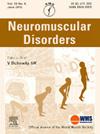The recent clinical trial of losmapimod for the treatment of facioscapulohumeral muscular dystrophy
IF 2.7
4区 医学
Q2 CLINICAL NEUROLOGY
引用次数: 0
Abstract
Facioscapulohumeral muscular dystrophy is a progressive muscle disorder that is likely linked to aberrant DUX4 expression. Losmapimod, a p38 kinase inhibitor, was utilized to suppress DUX4 and its downstream effects. Phase I/II clinical trials showed promising functional improvements in muscle strength and reachable workspace, despite showing no significant reduction in DUX4-driven gene expression. Based on these findings, a larger phase III trial was conducted, prioritizing functional outcomes. However, the trial failed to demonstrate a clear clinical benefit, highlighting key challenges in drug development for the disease. Notably, the underlying mechanism by which p38K inhibition affects DUX4 in mature muscle remains poorly understood, and most preclinical studies with losmapimod were performed in vitro on immature muscle cells. This raises concerns about the relevance of in vitro models for drug testing. The failure of losmapimod underscores the need for better disease models, such as xenografts, and a deeper understanding of DUX4 regulation, before advancing future therapies to clinical trials.
losmapimod治疗面肩肱肌营养不良症的最新临床试验
面肩肱骨肌营养不良是一种进行性肌肉疾病,可能与DUX4异常表达有关。利用p38激酶抑制剂Losmapimod抑制DUX4及其下游效应。I/II期临床试验显示,尽管dux4驱动的基因表达没有显著降低,但肌肉力量和可达工作空间的功能有希望得到改善。基于这些发现,进行了更大规模的III期试验,优先考虑功能结果。然而,该试验未能显示出明确的临床益处,凸显了针对该疾病的药物开发面临的关键挑战。值得注意的是,p38K抑制作用影响成熟肌肉DUX4的潜在机制尚不清楚,大多数losmapimod的临床前研究都是在体外未成熟肌肉细胞上进行的。这引起了对药物测试体外模型相关性的关注。losmapimod的失败强调了在将未来的治疗方法推进到临床试验之前,需要更好的疾病模型,如异种移植,以及对DUX4调控的更深入了解。
本文章由计算机程序翻译,如有差异,请以英文原文为准。
求助全文
约1分钟内获得全文
求助全文
来源期刊

Neuromuscular Disorders
医学-临床神经学
CiteScore
4.60
自引率
3.60%
发文量
543
审稿时长
53 days
期刊介绍:
This international, multidisciplinary journal covers all aspects of neuromuscular disorders in childhood and adult life (including the muscular dystrophies, spinal muscular atrophies, hereditary neuropathies, congenital myopathies, myasthenias, myotonic syndromes, metabolic myopathies and inflammatory myopathies).
The Editors welcome original articles from all areas of the field:
• Clinical aspects, such as new clinical entities, case studies of interest, treatment, management and rehabilitation (including biomechanics, orthotic design and surgery).
• Basic scientific studies of relevance to the clinical syndromes, including advances in the fields of molecular biology and genetics.
• Studies of animal models relevant to the human diseases.
The journal is aimed at a wide range of clinicians, pathologists, associated paramedical professionals and clinical and basic scientists with an interest in the study of neuromuscular disorders.
 求助内容:
求助内容: 应助结果提醒方式:
应助结果提醒方式:


